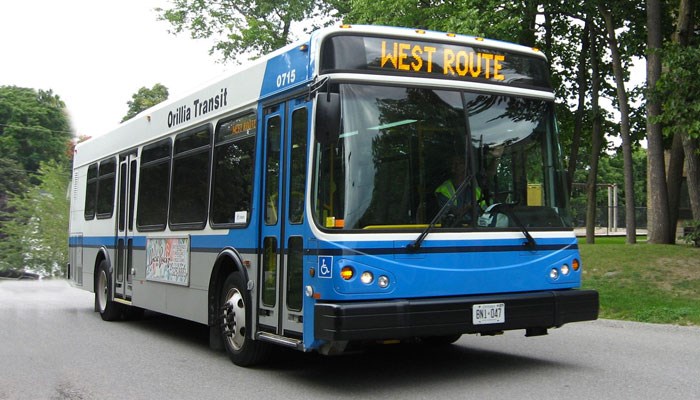Free teen passes, on-demand service, and other new wrinkles could be coming soon to Orillia’s transit system.
In an effort to increase ridership and improve the system, the city’s transit advisory committee has put together six recommendations for council to consider, which were finalized at its meeting this week.
Many of the recommendations come with the aim of increasing ridership, which could increase the city’s share of provincial gas tax funding each year, while others aim to directly improve service for transit users.
The recommendations are as follows:
- Implementing a free, unlimited use teen pass for residents ages 13-19, to increase ridership and facilitate travel to after-school programming, as a one-year pilot project to gather data;
- Reducing senior fares to a flat rate of $2, representing a 30 per cent reduction in fares, or twice the discount council approved during 2023 budget deliberations;
- Introducing free promotional transit days, such as Earth Day, as well as a ‘Transit Talk Day’ where councillors would ride buses to hear from residents, to increase ridership and introduce new users to the system;
- Forming a working group to examine potential for on-demand transit service, with aim of implementing recommendations after the city’s contract with TOK Transit expires in 2027;
- Modifying the system’s Laclie route to eliminate service on Maple Drive and redirect it to Sundial Drive, with the aim of servicing more people as it is a higher density area;
- Implementing on-demand booking for OWLS (Orillia Wheelchair Limousine Service), to improve efficiency and user experience, as well as provide insight for broader on demand service in the future
The recommendations come at the behest of council, which directed the committee to draft a report after Mayor Don McIsaac unsuccessfully proposed service cuts during off-peak hours with lower ridership, in order to save city funds. Click here to read the original story.
Committee chair Brandon Amyot said the committee set out to improve service and increase ridership without bringing cuts to service.
“I think the committee agreed from day one that we don't want to see service cuts,” Amyot told OrilliaMatters. “What you do see (are) some really interesting ideas around how (we can) actually get more value for every dollar we put into transit.”
Amyot, who said the service is a “public good” for residents and visitors, said they recognize the need to both invest in transit and make sure it’s financially sustainable.
“We recognize it costs money, obviously, on the taxpayer; it costs money on service users who are paying into it, and it costs money in other ways, but at the end of the day I think we can't look at it as a cost recovery model,” Amyot said.
“However, we do want it to be sustainable, and that's something I think the committee very much agrees with.”
The committee sought public input through the process, and Amyot said numerous committee members themselves are public transit users.
Although not all ideas made it into the report, Amyot is pleased with it as a starting point for city transit improvements.
“We’re a committee of volunteers, at the end of the day, and we are not subject matter experts. We can't put everything into it, but I think it's a really good start,” they said. “It reflects the fact that most of us on the transit committee are transit riders, so we know the system well, and I hope that council will see that a lot of effort was put into it.”
Coun. Jeff Czetwerzuk, a fellow member of the committee, agrees that striking a balance between service and cost is important moving forward.
"The idea is to save money and improve efficiency because, at the end of the day, transit is a service and our goal is to make sure that service is running as effectively and efficiently as possible, but it's also not a burden on the taxpayer," he told OrilliaMatters.
"To strike a balance, or as close as possible, will be the best-case scenario, and that's what we're really trying to do with this report."
Czetwerzuk said increasing ridership, such as through the teen pass, is a good way to get more money into the local economy, and he noted the provincial gas tax, which is allotted based on ridership, needs to be used towards transit systems.
"For every dollar we spend on transit, that money we get back into the economy. It might not be direct dollars in the economy, but we can see it through jobs, getting people to work ... so I think just starting that with our teen pass is a good way to get people familiar with the bus and getting people to ride," he said.
He also hopes to see on-demand transit come to Orillia, which could bring direct rides to users.
"You (can) save lots of money in the long run, and it would be a lot more efficient for people who are trying to get to work or get home from work on a regular schedule time," he said.
Council will consider the committee’s report and its recommendations at its May 1 meeting.
